Accommodation Tourism

What are some tips for finding ethical and sustainable accommodation options while traveling ?
When traveling, finding ethical and sustainable accommodation options is crucial to promote responsible tourism that benefits the environment and local communities. Here are some tips to help you make eco-friendly choices: 1. Research before you go by looking for certifications, reading reviews, and checking the website of potential accommodations for their sustainability practices. 2. Choose eco-friendly options like eco-lodges or eco-hotels that prioritize sustainability, or consider homestays to support local communities and reduce your carbon footprint. 3. Support local communities by choosing locally owned accommodations and participating in community tourism projects offered by some properties. 4. Minimize your environmental impact by reducing water usage, conserving energy, and limiting plastic usage during your stay. By following these tips, you can contribute to a more responsible form of tourism that benefits both the environment and local communities.
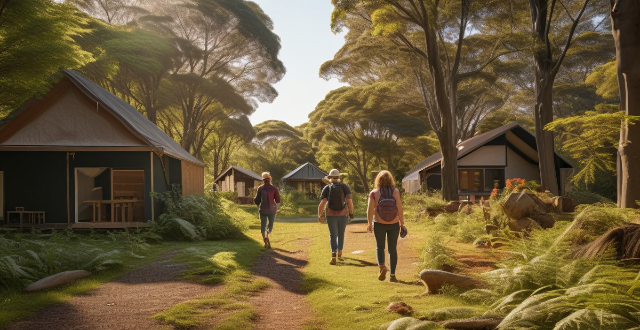
What role do tourists play in contributing to climate change through their travel activities ?
Tourism, while beneficial economically and culturally, contributes significantly to climate change due to carbon emissions from various travel activities. These include air travel, land travel, accommodation, activities, food and beverage choices, shopping habits, and packing and planning decisions. To mitigate this impact, tourists can offset emissions, choose sustainable travel options, stay in eco-friendly accommodations, participate in responsible tourism, reduce waste, support local produce, shop mindfully, plan ahead, advocate for change, and educate others on responsible travel practices.

What strategies can low-income countries adopt to attract more tourists and boost their tourism industry ?
Low-income countries face challenges in attracting tourists due to limited infrastructure and resources, but can boost their tourism industry by developing infrastructure, promoting local culture, offering affordable packages, focusing on sustainable tourism, partnering with agencies, and improving safety.

How does eco-tourism impact local communities ?
Eco-tourism, a form of sustainable tourism, focuses on responsible travel to natural areas that conserves the environment and improves the well-being of local people. It has a positive impact on local communities in various ways, including economic benefits such as job creation, income generation, infrastructure development, and foreign exchange earnings. Eco-tourism also promotes environmental conservation by encouraging sustainable practices among local communities, such as habitat protection, wildlife conservation, and education on sustainable practices. Additionally, it helps preserve cultural heritage by showcasing local traditions, customs, and way of life, as well as promoting cultural exchange and artisan development. Finally, eco-tourism contributes to social development by improving healthcare access, creating education opportunities, promoting gender equality, and empowering local communities through involvement in decision-making processes related to tourism development and management.

How does food tourism impact local economies and cultures ?
Food tourism, also known as culinary or gastronomy tourism, has significant impacts on local economies and cultures. Economic benefits include job creation, increased revenue for local businesses, tourism diversification, infrastructure development, and value addition to local products. Culturally, food tourism promotes the preservation of traditions, cultural exchange, heritage promotion, adaptation and innovation, and community engagement. However, there are potential downsides such as overcommercialization, resource depletion, and pricing issues that require careful management to ensure authenticity and sustainability.

What are the benefits of eco-tourism ?
Eco-tourism, also known as ecological tourism or sustainable tourism, has become increasingly popular in recent years. It involves visiting natural areas to experience and appreciate the environment without causing any harm to it. Here are some of the benefits of eco-tourism: 1. Environmental Benefits: - Conservation of Natural Resources: Eco-tourism promotes the conservation and preservation of natural resources such as forests, wildlife, and water bodies. This helps to maintain a healthy ecosystem for future generations. - Reduction in Carbon Footprint: Eco-tourism encourages travelers to use eco-friendly transportation methods like walking, cycling, or public transport. This reduces carbon emissions and helps combat climate change. - Protection of Endangered Species: By promoting eco-tourism, we can protect endangered species from poaching and hunting. This helps to maintain biodiversity and preserve rare animals and plants. - Promotion of Sustainable Practices: Eco-tourism promotes sustainable practices among local communities, such as using renewable energy sources, reducing waste, and conserving water. 2. Economic Benefits: - Job Creation: Eco-tourism creates job opportunities for local people, especially those who have limited access to formal education and training. This helps to reduce poverty and improve living standards in rural areas. - Income Generation: Eco-tourism generates income for local communities through activities like guided tours, accommodation services, and sale of handicrafts made from locally sourced materials. - Diversification of Economy: Eco-tourism helps to diversify the economy by providing an alternative source of revenue for local communities. This reduces their dependence on traditional livelihoods like farming and fishing. 3. Social Benefits: - Cultural Exchange: Eco-tourism provides an opportunity for cultural exchange between tourists and local communities. This helps to promote understanding and appreciation of different cultures and traditions. - Educational Opportunities: Eco-tourism offers educational opportunities for both tourists and local communities. Tourists learn about the environment, wildlife, and cultural heritage, while local communities gain knowledge about sustainable practices and environmental conservation. - Community Empowerment: Eco-tourism empowers local communities by giving them a voice in decision-making processes related to tourism development. This helps to ensure that tourism activities align with their needs and priorities. - Enhanced Quality of Life: Eco-tourism enhances the quality of life for local communities by improving infrastructure facilities like roads, healthcare centers, and schools. This leads to better living conditions and improved well-being.
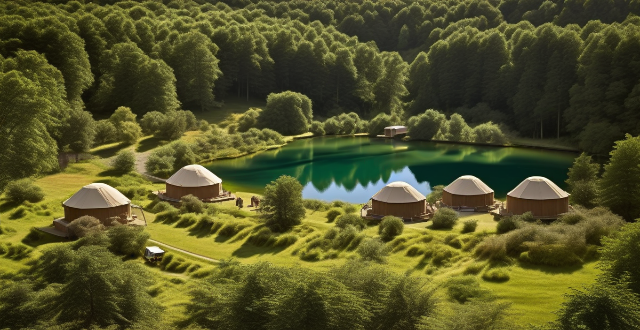
What are some examples of negative impacts of tourism on the environment ?
Tourism can have negative impacts on the environment, including destruction of natural habitats, pollution, overuse of resources, cultural impacts, physical degradation, and contributing to climate change. It is important to manage tourism sustainably to minimize these effects and preserve the planet's natural beauty for future generations.

How do sports tourism and mega-events shape the urban landscape and infrastructure ?
Sports tourism and mega-events significantly impact the urban landscape and infrastructure, driving developments in sports facilities, public spaces, urban renewal projects, transportation systems, accommodation facilities, and utility services. These events also raise environmental concerns, prompting host cities to implement sustainable practices. Balancing these developments with environmental considerations is crucial for creating lasting legacies that benefit both current residents and future generations.

What is the future of space tourism and its implications on Earth's resources ?
The development of space tourism by private companies like SpaceX, Blue Origin, and Virgin Galactic may make it more accessible to the public in the future. However, it raises concerns about its environmental impact, economic considerations, ethical concerns, and long-term sustainability. It is crucial to consider these implications to ensure responsible use of Earth's resources while exploring space tourism.

How do food festivals impact tourism in a region ?
Food festivals significantly impact tourism in a region, offering economic benefits and promoting cultural exchange. They attract visitors, boost spending, create jobs, and support local businesses. Culinary diversity, community engagement, and media exposure enhance the region's brand image. Sustainability is crucial for supporting local farmers and managing waste. Successful examples include tomato, wine & cheese, and seafood festivals. Food festivals are powerful tools for driving tourism and enriching the travel experience.

Do tennis training camps provide accommodation and meals for participants ?
Tennis training camps offer a variety of services, including accommodations and meals. Residential camps typically provide dormitory-style accommodations with shared bathrooms and three meals per day in a cafeteria or dining hall on campus. Non-residential camps do not provide accommodations or meals for participants, so participants must arrange their own lodging and food options.
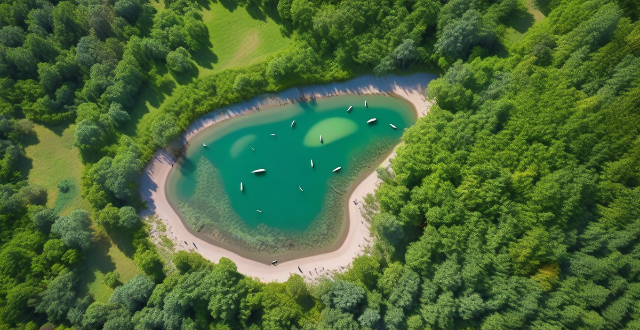
What are some popular eco-tourism destinations around the world ?
Eco-tourism is a form of tourism that focuses on conserving the environment and improving the well-being of local communities. Some popular eco-tourism destinations around the world include Costa Rica, New Zealand, Galapagos Islands, Iceland, and Borneo. In Costa Rica, visitors can enjoy bird watching, hiking in national parks, visiting turtle nesting sites, and surfing and snorkeling in the Pacific Ocean. In New Zealand, visitors can visit glaciers and fiords, trek through national parks, watch whales and dolphins in the Bay of Islands, and participate in Maori cultural experiences. The Galapagos Islands offer snorkeling with sea lions and marine iguanas, watching giant tortoises and land iguanas in their natural habitat, hiking through volcanic landscapes, and visiting research stations and learning about conservation efforts. Iceland offers watching the Northern Lights, hiking through national parks and nature reserves, visiting geothermal areas and bathing in natural hot springs, and whale watching tours in the Atlantic Ocean. Finally, Borneo offers visiting orangutan sanctuaries and rehabilitation centers, trekking through rainforests and visiting caves, river cruising and exploring mangrove forests, and visiting traditional villages and experiencing local culture.

What are the safety measures taken for space tourism ?
Space tourism requires rigorous safety measures, including physical trainingSpace tourism requires rigorous safety measures, including physical trainingancy, medical screenings, including physical training, spacecraft redundancy, medical screenings, and reliable communication systems.
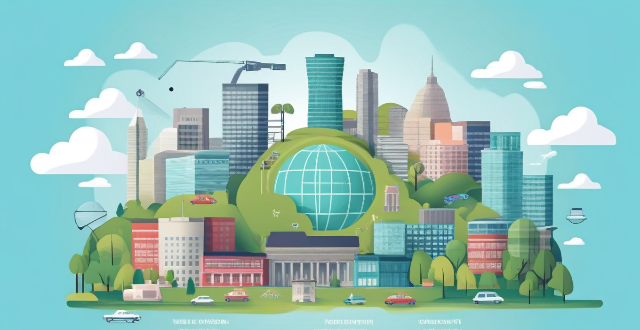
How is the tourism industry adapting to climate change-related risks and opportunities ?
The tourism industry, a significant contributor to the global economy, has been profoundly affected by climate change. The sector is now compelled to adapt to the associated risks and opportunities in various ways, including developing disaster management plans, building more resilient infrastructure, promoting sustainable tourism practices, diversifying offerings to attract tourists throughout the year, adopting green initiatives, developing nature-based tourism activities, creating wellness retreats, and providing educational programs about the connection between climate change and health. By implementing innovative solutions and embracing sustainability, the sector aims to mitigate the negative impacts of climate change and ensure its long-term viability.

How do I plan a self-drive tour through the Australian outback ?
Planning a Self-Drive Tour through the Australian Outback requires careful consideration of vehicle selection, route planning, accommodation, supplies, safety measures, legal requirements, and cultural respect. Essential steps include choosing an appropriate vehicle, booking accommodations in advance, packing emergency supplies, checking weather conditions, informing others about your itinerary, and familiarizing yourself with local customs. Popular routes such as The Red Centre Way, The Savannah Way, and The Explorer's Way offer unique experiences and breathtaking landscapes. Proper preparation ensures a safe and memorable adventure through Australia's vast outback.

What is the impact of sports tourism on community development ?
Sports tourism, which involves individuals or groups traveling to participate in sports events or recreational activities, has a significant impact on community development. This impact is multifaceted, encompassing economic, social, and environmental dimensions. Economically, sports tourism leads to job creation in various sectors, including tourism, event management, and infrastructure development. It also generates revenue through direct spending by visitors and increased tax revenue for local governments. Socially, it fosters community cohesion, promotes health and well-being, and provides educational and training opportunities. Environmentally, sports tourism can encourage sustainable practices and contribute to conservation efforts. Overall, sports tourism plays a crucial role in community development, but its benefits must be balanced against potential negative consequences.

How can I find local experience activities that support sustainable tourism ?
Finding local experience activities that support sustainable tourism is crucial for travelers who want to make a positive impact on the communities they visit. Here's how to do it: 1. **Research Online**: Use sustainable travel portals like Responsible Travel and Green Globe, and check local tourism boards and conservation groups for eco-friendly activities. 2. **Social Media and Forums**: Join travel communities on Facebook and Reddit, and follow influencers and bloggers who focus on sustainable travel for recommendations. 3. **Local Guidebooks and Magazines**: Look for specialized publications like "The Sustainable Travel Handbook" and local magazines featuring eco-friendly activities. 4. **Directly Contact Local Businesses**: Reach out to eco-friendly accommodations like eco-lodges and farm stays, and inquire at local restaurants, especially those focusing on farm-to-table or vegetarian options. 5. **Attend Local Events and Fairs**: Participate in environmental festivals and cultural fairs, and visit farmers markets and artisan markets for insights into sustainable activities. 6. **Use Mobile Applications**: Download apps like EcoCompanion and Book Different to find unique and sustainable accommodations and activities. 7. **Work with Local Guides**: Hire sustainable tour guides and participate in community-based tours that support local economies and conservation efforts. By employing these strategies, you can ensure your travels not only enrich your personal experiences but also contribute positively to the environment and local communities, promoting sustainable tourism practices.
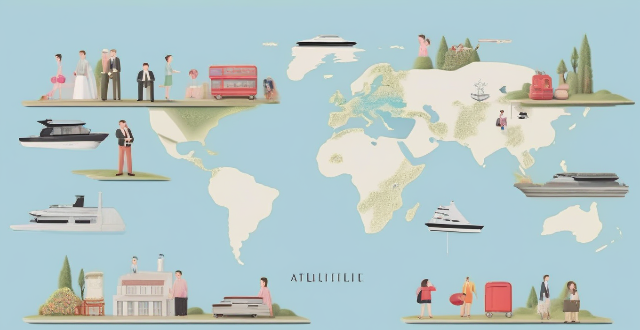
What is the impact of sports tourism on international relations and economy ?
Sports tourism, involving travel for sports events, significantly impacts the global tourism industry. It not only boosts the economy through increased revenue and job opportunities but also enhances international relations by promoting cultural exchange and diplomatic engagement. Sports events serve as platforms for peaceful competition, showcasing a country's soft power and fostering international collaboration.
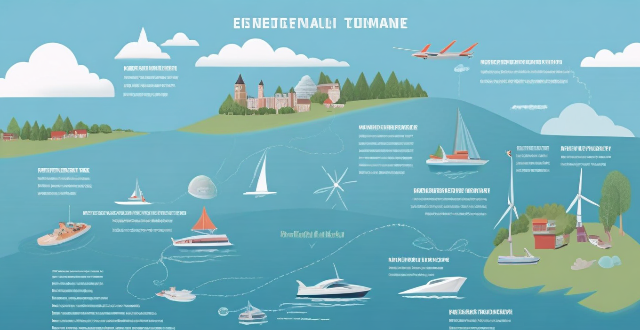
How do extreme weather events such as hurricanes and floods affect tourism ?
Extreme weather events, such as hurricanes and floods, significantly impact the tourism industry by disrupting travel plans, damaging infrastructure, and harming local economies. Travelers may face cancellations, rescheduling, and transportation disruptions, leading to financial losses for both tourists and businesses. Damaged accommodations, inaccessible attractions, and reduced capacity can also deter visitors. Moreover, job losses and economic downturn can occur in areas heavily reliant on tourism. It is crucial for destinations to develop strategies for preparedness, response, and recovery to minimize these adverse effects.

How will commercial space tourism change the way we view Earth and space ?
The advent of commercial space tourism is set to revolutionize our understanding of both Earth and space by making space travel more accessible. It allows us to view our planet from a different perspective, fostering a greater sense of global awareness and interconnectedness, as well as an appreciation for the fragility and beauty of our planet. Additionally, it provides the opportunity for people to experience space firsthand, leading to a deeper understanding of the challenges and opportunities presented by space exploration, renewed interest in science and technology, and increased demand for education in STEM fields. Overall, commercial space tourism has the potential to change the way we view Earth and space by providing unique perspectives and experiences that can help us better appreciate our planet and expand our understanding of the universe beyond.

How can I find affordable accommodations while backpacking in Europe ?
Backpacking through Europe can be an affordable adventure with the right accommodation choices. Options include hostels for social, budget-friendly stays; Couchsurfing for cultural immersion and free lodging; camping for outdoor enthusiasts on a tight budget; Airbnb for a homey feel at various price points; budget hotels for more comfort and privacy; and house-sitting for unique experiences in exchange for caretaking duties. Each option has its pros and cons, so it's important to consider your preferences and budget when planning your trip. By combining different types of accommodations, you can save money while still enjoying your European backpacking adventure.

How can I save money on accommodation while traveling ?
Saving money on accommodation while traveling requires careful planning and research. Here are some tips: 1. **Choose Budget-Friendly Options** such as hostels, guesthouses, and budget hotels. Consider staying in a vacation rental or apartment for longer stays. Pros include lower cost, opportunities to meet other travelers, and often central locations. Cons may be lack of certain amenities, noisy or crowded conditions, and varying quality. 2. **Travel Off-Peak** to take advantage of lower rates during off-peak seasons or midweek. Pros include lower rates, fewer crowds, and easier access to deals and discounts. Cons may be limited hours at attractions, less than ideal weather, and limited availability of certain accommodation types. 3. **Negotiate and Look for Deals** by contacting hotel staff or searching online for discounts. Pros include potential savings on already discounted rates, exclusive promotions, and the ability to customize your stay. Cons may require flexibility in travel dates and destinations, restrictions or blackout dates on deals, and varying quality of rooms and services. 4. **Use Loyalty Programs** offered by hotel chains or booking sites to earn points for free nights or upgrades. Pros include earning rewards for future stays, exclusive member rates and benefits, and the possibility of room upgrades and other perks. Cons may require multiple stays to accumulate enough points, rewards may have expiration dates or restrictions, and some programs may charge fees or have complex rules.

How do sports event organizers manage logistics such as transportation, accommodation, and catering for athletes and officials ?
Managing logistics for sports events involves transportation, accommodation, and catering for athletes and officials. Sports event organizers arrange airport transfers for athletes and officials arriving from different locations and provide shuttle services between the event venue, hotels, and training facilities. They also allocate sufficient parking space near the event venue and collaborate with local authorities to enhance public transportation options during the event. For accommodation, they negotiate group rates with nearby hotels and book rooms in advance for athletes and officials, considering their preferences such as single or double occupancy rooms, smoking or non-smoking rooms, and special dietary requirements. They also provide information about nearby hotels and their availability on the event website or through a dedicated hotline and establish partnerships with hotels to offer discounted rates to spectators attending the event. In terms of catering, they create meal plans tailored to the nutritional needs of athletes and officials, address any dietary restrictions or allergies by offering customized meal options, set up concession stands at strategic locations within the event venue to cater to the needs of spectators, and provide catering services with a wider selection of food and beverages for premium seating areas or VIP lounges. Overall, managing logistics for sports events requires careful planning, coordination, and execution to create a seamless experience for all involved parties.

How does eco-tourism contribute to conservation efforts ?
Eco-tourism, or ecological tourism, plays a crucial role in conservation efforts by fostering sustainable practices and raising awareness about the importance of preserving biodiversity and ecosystems. It contributes to conservation in several ways: 1. **Raising Environmental Awareness**: Informed decision-making and behavior changes support conservation goals through educational opportunities provided during eco-tourism experiences. 2. **Direct Conservation Funding**: Fees for park entry, donations to local conservation groups, and investments in infrastructure that benefits both tourists and wildlife directly fund conservation projects. 3. **Encouraging Sustainable Practices**: By promoting eco-friendly transportation, recycling, composting, and community involvement in sustainable practices, eco-tourism reduces the overall environmental footprint of tourism activities. 4. **Supporting Local Economies**: Eco-tourism supports local economies, creating an incentive for communities to protect their natural resources as they rely on them for income. 5. **Protecting Habitats and Biodiversity**: Attracting visitors to protected areas or regions where conservation is a priority helps maintain healthy ecosystems and diverse wildlife populations. Overall, eco-tourism demonstrates that tourism can be a force for good when it operates with a focus on ecological sustainability and community involvement.
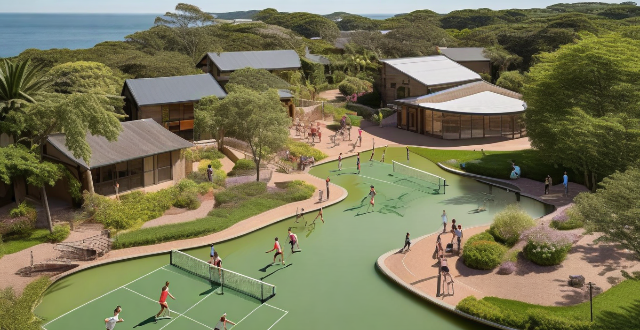
Can sports tourism be made more sustainable ?
To make sports tourism more sustainable, strategies can beTo make sports tourism more sustainable, strategies can be: environmental sustainability, social sustainability strategies can be employed in three main areas: environmental sustainability, social sustainability, and economic sustainability. For environmental sustainability, reducing the carbon footprint through flight offsetting and promoting public transportation, building green venues with eco-friendly design and waste management plans, and conserving water through rainwater harvesting and water-efficient fixtures are recommended. For social sustainability, engaging local communities in event planning, ensuring accessibility and inclusivity, and promoting cultural exchange are important. Economic sustainability can be achieved by supporting local economies through local procurement and job creation, adhering to fair wages and working conditions, and investing in long-term legacy planning. Additionally, promoting sustainable practices through education and awareness, partnerships with NGOs, and encouraging sponsors and partners to adopt sustainable practices as part of their corporate social responsibility initiatives can further enhance the sustainability of sports tourism.

How does tourism impact local communities around heritage sites ?
Tourism has become an essential part of the global economy, and its impact on local communities around heritage sites is significant. The following sections will discuss the positive and negative effects of tourism on these communities. ## Positive Effects ### Economic Benefits 1. **Job Creation**: Tourism creates job opportunities for locals, such as tour guides, hotel staff, and restaurant workers. 2. **Income Generation**: Tourists spend money on local products and services, which boosts the economy. 3. **Infrastructure Development**: Improved roads, transportation systems, and communication networks are often developed to accommodate tourists. ### Cultural Preservation 1. **Heritage Conservation**: Tourism revenue can be used to preserve and maintain heritage sites. 2. **Cultural Exchange**: Interaction with tourists promotes cultural exchange and understanding. 3. **Traditional Arts and Crafts**: Tourists often purchase traditional arts and crafts, encouraging their preservation and promotion. ### Environmental Awareness 1. **Eco-Tourism**: Some tourists are interested in eco-friendly activities, promoting sustainable tourism practices. 2. **Conservation Efforts**: Tourism revenue can fund environmental conservation projects near heritage sites. ## Negative Effects ### Environmental Degradation 1. **Overcrowding**: Large numbers of tourists can lead to overcrowding and damage to fragile ecosystems. 2. **Pollution**: Increased traffic and waste production can contribute to pollution issues. 3. **Resource Depletion**: Overuse of resources like water and energy can strain local supplies. ### Cultural Disruption 1. **Commercialization**: The focus on tourism can lead to the commercialization of cultural experiences, diluting their authenticity. 2. **Loss of Traditions**: As locals adapt to tourist demands, some traditions may be lost or altered. 3. **Cultural Sensitivity Issues**: Tourists may not always respect local customs and practices, leading to tensions. ### Economic Disparities 1. **Leakage of Revenue**: Not all tourism revenue stays within the local community, especially if managed by external corporations. 2. **Unequal Distribution**: Benefits from tourism may not be evenly distributed among all members of the community. 3. **Dependency on Tourism**: Over-reliance on tourism can make local economies vulnerable to fluctuations in tourist numbers. ## Conclusion The impact of tourism on local communities around heritage sites is complex, with both positive and negative aspects. It is crucial for stakeholders to manage tourism responsibly to maximize benefits while minimizing harm to the environment, culture, and economy of these communities. By fostering sustainable tourism practices, we can ensure that future generations can also enjoy these valuable heritage sites and the unique cultures they represent.
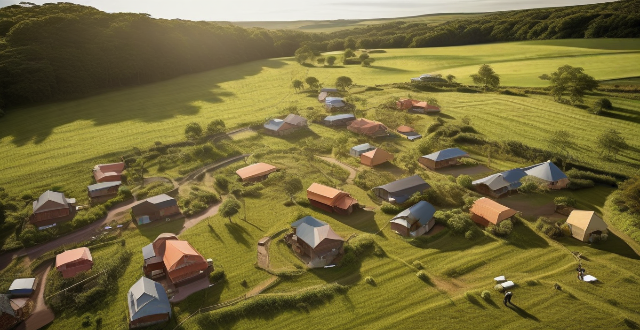
How can sustainable tourism help mitigate climate change ?
Sustainable tourism can help mitigate climate change by reducing carbon emissions, promoting conservation, supporting local communities, educating travelers, and restoring degraded lands. It encourages low-carbon transportation, eco-friendly accommodations, protected areas, wildlife conservation, local employment, local products and services, awareness raising, cultural exchange, minimizing plastic use, waste management, reforestation projects, and eco-agriculture.

How do you ensure sustainable tourism at heritage sites ?
To ensure sustainable tourism at heritage sites, it isTo ensure sustainable tourism at heritage sites, it is local communities about the importance of it is crucial to educate visitors and local communities about the importance of conservation, manage visitor impact through carrying capacity studies and timed entry systems, promote responsible tourism practices like sustainable transportation and waste management, support local economies by hiring local staff and promoting local products, collaborate with governments and organizations for funding and partnerships, regularly monitor and evaluate site conditions and management effectiveness, and preserve cultural integrity by offering authentic experiences and training staff in cultural sensitivity.
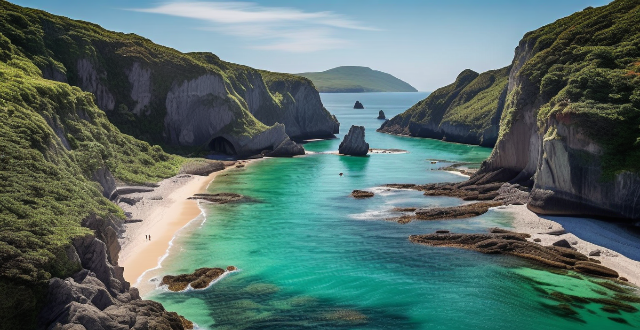
What role do ecological protection areas play in sustainable tourism development ?
Ecological protection areas are vital for sustainable tourism, conserving resources and biodiversity while offering unique experiences to visitors. They also provide educational opportunities and support local livelihoods, promoting long-term sustainability and planetary health.

How has sports culture influenced globalization ?
Sports culture has significantly influenced globalization by promoting international cooperation, cultural exchange, economic benefits, media coverage, and tourism. Sports events like the Olympics and World Cup foster goodwill among countries, while also generating revenue through ticket sales and sponsorships. Athletes from different nations come together to share their skills and traditions, leading to mutual respect and appreciation of diverse cultures. Sports tourism is a growing industry that promotes cultural exchange and economic growth in host cities and countries. Overall, sports culture plays a crucial role in promoting global awareness and understanding.